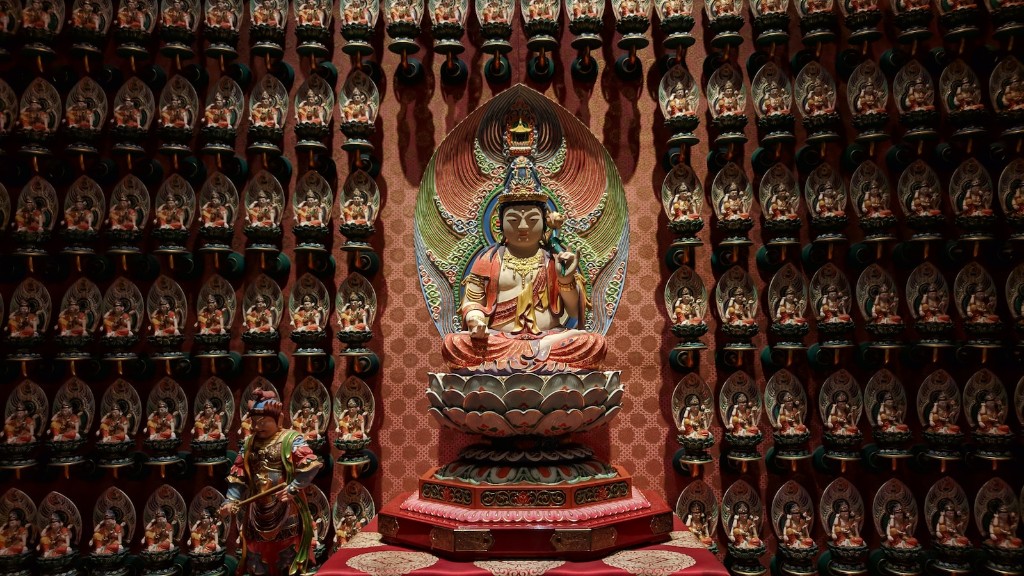Buddhism is a religion and philosophy founded in India by Siddhartha Gautama. The principles of Buddhism are based on the Four Noble Truths and the Eightfold Path. The Four Noble Truths state that suffering is an inherent part of life, that suffering is caused by desire and attachment, that suffering can be relieved by detachment from desire, and that the way to detachment is the Eightfold Path. The Eightfold Path is a code of ethics comprising right understanding, right resolve, right speech, right action, right livelihood, right effort, right mindfulness, and right concentration.
The Four Noble Truths are the most basic principles of Buddhism. These truths are that life is suffering, that suffering is caused by desire, that suffering can be ended by eliminating desire, and that this can be accomplished by following the Eightfold Path.
What are the 7 principles of Buddhism?
The Noble Eightfold Path is a path to freedom from suffering. It is a path of wisdom, compassion and inner strength. The path is open to everyone, regardless of their background or belief system. The steps of the Noble Eightfold Path are Right Understanding, Right Thought, Right Speech, Right Action, Right Livelihood, Right Effort, Right Mindfulness and Right Concentration.
It is said that the Buddha came to understand the four Noble Truths during his meditation under the bodhi tree. The four truths are: the truth of suffering, the truth of the origin of suffering, the truth of the cessation of suffering, and the truth of the path to the cessation of suffering. The Buddha is said to have attained enlightenment after realizing these truths.
What are the 3 main beliefs of Buddhism
Buddhism is a religion that is based on the teachings of Siddhartha Gautama. The main principles of this belief system are karma, rebirth, and impermanence.
Karma is the belief that our actions have consequences, both good and bad. This can impact our current life and our future lives.
Rebirth is the belief that after we die, our soul is reborn into another body. This cycle of birth and death is called samsara.
Impermanence is the belief that nothing in life is permanent. This includes our bodies, our thoughts, and our emotions.
The Five Precepts are basic guidelines for living a moral and ethical life. They are:
1. Refrain from taking life – respect all life and do not kill any living being.
2. Refrain from taking what is not given – do not steal from anyone.
3. Refrain from the misuse of the senses – do not have too much sensual pleasure.
4. Refrain from wrong speech – do not lie or speak harshly to others.
5. Refrain from intoxicants that cloud the mind – do not use drugs or alcohol.
What is the most important rule in Buddhism?
It is important to abstain from taking life because it is an act that goes against the natural order of things. All living beings have a natural right to life, and taking that away from them is an act of violence. Furthermore, it is an act that creates suffering, not only for the victim but also for the person who is doing the killing.
The Eightfold Path is a series of eight steps that Buddhists can follow to help them lead a contented (satisfactory) life. They are: Right Understanding; Right Thought; Right Speech; Right Action; Right Livelihood; Right Effort; Right Mindfulness; Right Concentration.
What is the Buddhist way of life?
The Middle Way is the path to enlightenment that is common to all schools of Buddhism. It is the path of moderation, avoiding both the extremes ofSelf-indulgence and self-mortification. The Middle Way leads to the highest good, Nirvana.
Buddhists believe that food should be prepared as a spiritual exercise with attention to balance, harmony, and delicacy. Conscious eating is followed among all Buddhists. Buddha advised monks to avoid eating 10 kinds of meat for self-respect and protection: humans, elephants, horses, dogs, snakes, lions, tigers, boars and hyenas.
How to practice Buddhism daily
Practicing Buddhism in daily life can help us to cultivate a kind heart. By finding time to meditate each day, we can connect with our innermost thoughts and feelings, and develop a deeper understanding and compassion for ourselves and others. Practicing Dharma at the workplace can help us to be more mindful of our actions and their impact on others. And by being mindful of living in an interdependent world, we can appreciate the interconnectedness of all beings and act with kindness and consideration for all.
The Five Precepts are guidelines for living a moral and ethical life in Buddhism. They are common to all schools of Buddhism and are considered the minimum requirements for someone who considers themselves a follower of the Buddha. The Five Precepts are:
1. Not to take the life of any living creature.
2. Not to take anything that is not freely given.
3. To abstain from sexual misconduct.
4. To refrain from telling lies.
5. To avoid taking intoxicants.
What is the highest moral virtue in Buddhism?
Śīla in Buddhism is a code of conduct that embraces a commitment to harmony and self-restraint with the principal motivation being nonviolence, or freedom from causing harm.
The Ten Grave Precepts are guidelines for living a life of integrity and respect. They are:
Respect life – Do not kill
Be giving – Do not steal
Honor the body – Do not misuse sexuality
Manifest truth – Do not lie
Proceed clearly – Do not cloud the mind
See the perfection – Do not speak of others’ errors and faults
Realize self and others as one – Do not elevate the self and blame others
Can a Buddhist drink
Buddhism teaches that drinking or using other kinds of drugs can cause carelessness and should be avoided. Strong Buddhist beliefs would be expected to have a significant impact on alcohol use.
Buddhists may not celebrate Christmas in the traditional sense, but many do still participate in the holiday season. Among Asian American Buddhists, three-quarters celebrate Christmas in some way. For some, this may mean going to church, while others may simply exchange gifts with family and friends. On Dec 8, some Buddhists also observe Bodhi Day, which marks when the Buddha reached enlightenment. Bodhi Day is often celebrated with special meals, meditation, and prayer.
What is the dress code for Buddhism?
When visiting a temple or religious site, it is considered most respectful to cover your shoulders and knees, as well as cleavage and midriff areas. Shoes should also be removed when entering any temple.
When we pray to the buddhas, bodhisattvas, and spiritual masters, we are asking for their help in invoking the enlightened qualities of our own heart and mind. By letting go of the ego’s resistance to humility, we can open ourselves up to the possibility of achieving these qualities ourselves.
Warp Up
The Three Universal Truths are the basis of Buddhism. These truths are:
1. Everything has a cause.
2. Nothing lasts forever.
3. Nirvana is the highest state that can be achieved.
The basic principles of Buddhism are the Four Noble Truths, the Eightfold Path, and the Three Universal Truths. The Four Noble Truths are that suffering exists, that suffering has a cause, that suffering can be ended, and that there is a path to the end of suffering. The Eightfold Path is the way to end suffering, and the Three Universal Truths are that everything is connected, that change is constant, and that there is a cause and effect for everything.


